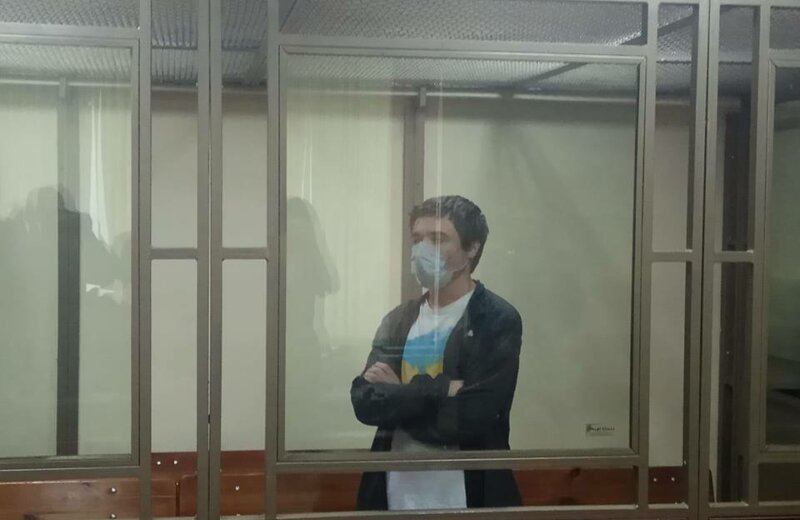The Russian Supreme Court has upheld a six-year sentence for a young Ukrainian kidnapped in Belarus and imprisoned in Russia on highly questionable terrorism charges.
On July 23, Russia’s highest court declared the sentence against 21-year-old Pavlo Gryb legal, despite his defense calling attention to inconsistent and inadmissible evidence used in the court of first instance, Russia’s TASS news agency reported.
“In the protocol (of Gryb’s) detention, the time and place where the document was drawn up are not true,” Gryb’s lawyer Marina Dubrovina said, according to TASS. “He was beaten and tortured with impunity, and they beat a confession out of him, which then formed the basis of the sentence. I believe that the sentence deserves cancellation.”
Gryb is one of more than 100 Ukrainians who are imprisoned or detained in Russia and in Russia-occupied Crimea on politically motivated charges.
In August 2017, Gryb, then 19, traveled from Ukraine to the city of Gomel, Belarus to meet with 16-year-old Tatiana Yershova, a Russian citizen from Sochi he had befriended online. There he was detained by plainclothes security agents, placed in a van, and later handed over to another group of people. This second group — presumably Russian security or law enforcement agents — took Gryb to Russia and “legalized” his arrest by claiming to have captured him on the territory of Russia.
Russian prosecutors accused Gryb of encouraging Yershova to commit a terrorist attack at her high school. They presented him as motivated by extremist Ukrainian nationalism. However, no terrorist attack was ever organized and carried out.
Moreover, a witness for the prosecution, Yershova’s closest friend, stated in a November 2018 court hearing that Gryb and Yershova’s chat conversations were romantic in nature and not political.
Additionally, during a hearing in January 2019, Gryb claimed that the Russian security agents who kidnapped him also beat and tortured him to extract a “formal confession.”
In March, a Russian court sentenced Gryb to six years in prison.
Medical emergency
Throughout his detention and trial, Gryb’s family and supporters have been sounding the alarm that he may not survive his time behind bars.
Gryb suffers from portal hypertension, a chronic illness that affects the function of his organs. He requires regular medical care, medications, and a special diet. During his time behind bars, Gryb has largely been denied access to both medical care and Ukrainian consuls.
As a result, he has developed cirrhosis of the liver and his vision has suffered serious damage, his father said in December.
In January, Gryb’s mother managed to convince the court to have him examined at a clinic outside the penitentiary system. The results offered a grim prognosis for the political prisoner: he showed signs of Alzheimer’s Disease, a neurologist concluded.
Gryb’s father, Ihor, continues to worry that his son will not survive in prison.
“Examinations of Pavlo shows that the dynamic is very negative and Pavlo’s spending further time behind bars will lead to his death,” he told Ukraine’s Espreso television channel on July 23. “Because in these inhumane prison conditions — and there will also be a prison transfer — it’s a direct path to death, because internal bleeding will start, and that’s it.”
Political reaction
On January 1, Ihor Gryb published an open letter from his son to Ukrainian President Volodymyr Zelensky and the Verkhovna Rada calling on them to “resolve the fates” of more than 100 Ukrainian political prisoners held in Russia.
In the letter, Pavlo Gryb also called on broader Ukrainian society, cultural actors, nationalists, volunteers and others to raise the subject of political prisoners wherever they can.
“Whatever disillusionment there may be in Ukraine, whatever authorities come to power on this wave of disappointment, it is their duty to free the hostages and political prisoners, closing after this the state border with Moscovy (i.e. Russia) and Belarus and tearing up diplomatic relations with all enemy states,” Gryb wrote. “We demand this.”
On July 18, the European Parliament passed a resolution calling on Russia to free political prisoners, including Gryb.
After the Russian Supreme Court decision, former President Petro Poroshenko tweeted that the ruling was “another confirmation that Moscow will further ignore the demands of the international community, if they won’t be strengthened by international pressure.”
“Last week, we managed to get our Pavlo mentioned in a resolution of the European Parliament,” Poroshenko added.
On July 24, the European Union also reacted to the ruling.
“Pavlo Gryb was sentenced without any justified accusations and should be quickly freed,” the EU representative office in Russia wrote on Twitter. “Because he suffers from a serious illness, he should receive access to specialized medical care as soon as possible.”



